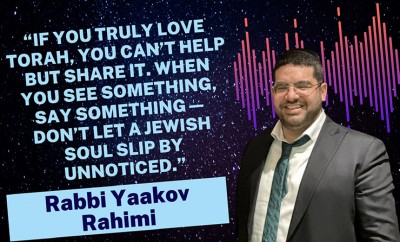
By Rabbi Yaniv Meirov – Episode 10, Premiered May 4, 2021, Chazaq Torah Talks
The moment Rabbi Yaakov Rahimi joined our program, the conversation was electric—down-to-earth, honest, and bubbling with contagious warmth. “Rabbi Rahimi!” I joked as we started, “you’re one of the millionaires of mitzvot, spreading Torah from coast to coast.” He grinned and shot right back: “It’s not about my opinion—it’s about what Hashem wants. We’re all here for one reason: to share Torah, to bring Hashem’s children home.”
Kiruv: Not a Club—A Calling for Every Jew
Rabbi Rahimi’s opening words set the tone: “Kiruv isn’t a special club. It’s not just for ‘those kiruv guys’—it’s every Jew’s responsibility. Kiruv is simply part of avodat Hashem. If you love Torah, you want to share it—just like when you get engaged, you can’t wait to tell the world!”
He challenged us with sincerity: “If Torah means so much, how can we not share it with everyone—especially those who never had the chance? It’s not about making speeches. It’s about seeing a fellow Jew and asking, ‘How can I help them connect?’”
Stepping Up—One Mitzvah at a Time
Rabbi Rahimi explained that leaving your comfort zone starts with empathy and simple action. “It’s like seeing someone trip in the street—you don’t need a class to know you should help.” When you see what’s happening beyond the walls of our yeshivot and schools, you can’t help but want to reach out.
He brought this home with a story from Myrtle Beach, South Carolina. While visiting a family sitting shiv'ah, he suggested gently to the boys in the house, “How about trying a mitzvah?” The mother—still in mourning—was thrilled; she’d been pleading with her sons to do something spiritual since her own mother had passed. Rabbi Rahimi handed out tzitzit he’d brought, and watched as the boys—who just moments earlier were distracted by their phones—embraced a new mitzvah with real joy. “There’s no feeling like it,” he reflected, “watching Jewish kids, maybe for the first time, take a step toward Hashem.”
Facing Today’s Challenges: What Our Teens Need Most
What’s holding back so many of our youth? Rabbi Rahimi didn’t hesitate: the three biggest hurdles are low self-esteem (“they don’t realize how much Hashem expects from them and how beloved they are”), the pull and dangers of phones and technology, and the loneliness of Shabbat in a digital world. “We need more Shabbat programs than anything else,” he said. “Teens want to keep Shabbat—they just need to know how, and have a place to go. Give them community, activities, and purpose, and you’ll see miracles.”
When it comes to technology, programs like TAG help, but real change comes from positive vision: “Don’t harp on mistakes—show how much better life can be, how much Hashem believes in them. Move forward, inspire, and teenagers will rise to the challenge.”
Every Jew Has a Role—See Something, Say Something
“Not everyone is a professional mekarev,” Rabbi Rahimi admitted, “but everyone can do something. Even if you can’t personally guide a struggling soul, you can make a call, offer a kind word, share a website, invite someone for Shabbat, or just show you care. When you see something, say something. Don’t walk by. That’s real kiruv.”
He emphasized that even small acts have enormous ripple effects: “Tell a public school kid about TorahAnytime.com. Invite someone for a meal. Share a word of Torah. You don’t have to be a big speaker; you just have to have a big heart.”
Carrying the Torch—Lessons from a Mentor
Reflecting on the recent yahrtzeit of Rabbi Aharon Walkin zt”l, Rabbi Rahimi grew emotional: “He was everything—father, rebbi, mentor, mashgiach. He taught me: Hashem’s greatest complaint will be if we don’t take care of the public school children. It’s not enough to sit in Lakewood or learn Torah all day—we have to bring Hashem’s children home. He would always say, ‘It’s just the beginning’—no matter what we’ve accomplished, there’s always more to do.”
A Final Challenge—Unleash Your Voice
Rabbi Rahimi closed with a striking teaching from the Zohar: “Just as we are punished for misusing speech, we’re also held accountable for not using our words to inspire others in Torah. If you have speech, use it! You don’t have to be a rabbi—say a kind word, share a Torah thought, invite someone in. Every Jew can do it.”
His challenge to us all: “Don’t underestimate your impact. When you see something, say something. Every word, every act, can change a Jewish life forever. And together, we’ll bring the geulah closer.”
Rabbi Yaniv Meirov is CEO of Chazaq and Rav of Congregation Charm Circle in Kew Gardens Hills. As Chazaq Torah Talks nears its 200th episode, Rabbi Meirov continues to bring heartfelt, relevant conversations to the Jewish world—bridging tradition with today’s challenges.
See Something, Say Something: Rabbi Yaakov Rahimi On The Everyday Mission Of Kiruv
Typography
- Smaller Small Medium Big Bigger
- Default Helvetica Segoe Georgia Times
- Reading Mode




